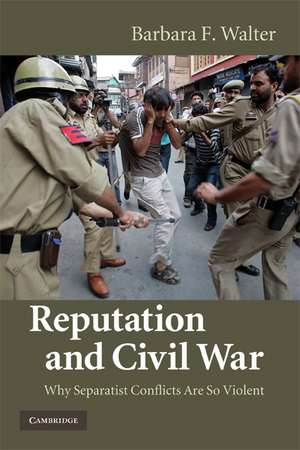Reputation and Civil War: Why Separatist Conflicts Are So Violent
Autor Barbara F. Walteren Limba Engleză Paperback – 26 aug 2009
| Toate formatele și edițiile | Preț | Express |
|---|---|---|
| Paperback (1) | 281.17 lei 43-57 zile | |
| Cambridge University Press – 26 aug 2009 | 281.17 lei 43-57 zile | |
| Hardback (1) | 705.61 lei 43-57 zile | |
| Cambridge University Press – 26 aug 2009 | 705.61 lei 43-57 zile |
Preț: 281.17 lei
Nou
Puncte Express: 422
Preț estimativ în valută:
53.81€ • 55.89$ • 44.70£
53.81€ • 55.89$ • 44.70£
Carte tipărită la comandă
Livrare economică 03-17 februarie 25
Preluare comenzi: 021 569.72.76
Specificații
ISBN-13: 9780521747295
ISBN-10: 0521747295
Pagini: 272
Ilustrații: 2 maps 13 tables
Dimensiuni: 152 x 228 x 15 mm
Greutate: 0.43 kg
Editura: Cambridge University Press
Colecția Cambridge University Press
Locul publicării:Cambridge, United Kingdom
ISBN-10: 0521747295
Pagini: 272
Ilustrații: 2 maps 13 tables
Dimensiuni: 152 x 228 x 15 mm
Greutate: 0.43 kg
Editura: Cambridge University Press
Colecția Cambridge University Press
Locul publicării:Cambridge, United Kingdom
Cuprins
Figures; Tables; Maps; Part I. Theory: 1. Introduction; 2. Reputation building and self-determination movements; Part II. Empirical tests: 3. An experimental study of reputation building and deterrence; 4. Government responses to self-determination movements; 5. Ethnic groups and the decision to seek self-determination; Part III. Case studies: 6. Indonesia: many ethnic groups, few demands; 7. The Philippines: few ethnic groups, many demands; Part IV. Conclusions: 8. Reputation building and deterrence in civil wars.
Recenzii
'… Walter shows that much of the answer lies in whether a state is faced with multiple potential challenges and therefore has to defend its reputation for holding firm. Rarely has such an important puzzle been so well explained.' Robert Jervis, Columbia University
'Barbara Walter strikes again! Her first book altered our thinking and our policies about civil war termination, showing that separating armies in civil wars incurs commitment problems that make these wars more difficult to end than interstate wars. This book, her second major work on civil wars, is equally stunning. Relying on theory, case studies, statistical and experimental analysis, it shows how reputation problems lead highly fragmented states to be more bellicose in the face of separatist rebellion that less fragmented states. Once again, Walter's work will impress academics and reframe public policy.' David D. Laitin, Stanford University
'… Barbara Walter makes an important contribution to debates in international relations as well as to the study of civil war.' Robert O. Keohane, Princeton University
'… the value of this book is the recognition of the importance of including future parties and future stakes in the models of bargaining and civil war. … [It] … provides an excellent study showing that when governments are facing movements seeking autonomy, they make strategic decision and invest in reputation-building.' International Affairs
'Barbara Walter strikes again! Her first book altered our thinking and our policies about civil war termination, showing that separating armies in civil wars incurs commitment problems that make these wars more difficult to end than interstate wars. This book, her second major work on civil wars, is equally stunning. Relying on theory, case studies, statistical and experimental analysis, it shows how reputation problems lead highly fragmented states to be more bellicose in the face of separatist rebellion that less fragmented states. Once again, Walter's work will impress academics and reframe public policy.' David D. Laitin, Stanford University
'… Barbara Walter makes an important contribution to debates in international relations as well as to the study of civil war.' Robert O. Keohane, Princeton University
'… the value of this book is the recognition of the importance of including future parties and future stakes in the models of bargaining and civil war. … [It] … provides an excellent study showing that when governments are facing movements seeking autonomy, they make strategic decision and invest in reputation-building.' International Affairs
Notă biografică
Descriere
Attempts to resolve why self-determination disputes between governments and ethnic minorities so often result in civil war.









